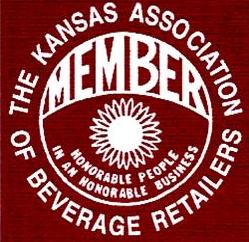Today, the House Federal and State Affairs committee radically altered HB 2196 and passed it. The intention of the underlying bill was to reduce citizenship requirements for distributors. This morning, committee members adopted an amendment to allow retailers to own an unlimited number of retail liquor stores.
Rep. J.R. Claeys (R-Salina) called his amendment pro-America and pro-jobs. The amendment was not made public prior to the committee meeting this morning, and there was no public hearing on the issue.
Since this was a new issue and had not been a part of the public hearing on HB 2196, the Chairman Steve Brunk (R-Wichita) said he was interested in hearing from people in the audience who wanted to comment. Amy Campbell, lobbyist for the Kansas Association of Beverage Retailers, was present and offered comments.
The issue of single licenses for retailers is not about commercial enterprise, it is about regulation. One of the strongest lessons from prohibition was that control of the marketplace for alcoholic liquor by one or a few interests results in regulatory problems. It is detrimental to public health and safety. So, an effective and efficient method of regulating alcoholic liquor is to require single ownership – single outlets. There are many states besides Kansas who use this system. In fact, many of the states that actually allow corporate / grocery sales of alcohol only allow a single license. Colorado is an example of that.
This amendment is a major restructuring / major policy change for the liquor control act. It is significant and should have its own bill and its own public hearing. There a many policy questions that should be reviewed – would it allow mingling inventory? Joint warehousing? Single point of delivery and payment? Could the locations share employees? What does it mean for volume discounting?
It has been said that we are using an artificial method of multiple licensing by allowing individuals’ spouses or adult children to own liquor stores. I want to point out that it would be illegal to just put someone’s name on the license. The individual must be engaged in the business, pay for the product, etc. Kansas has cited cases in the past where the ownership was artificial. This assures that the State has someone who is directly responsible for the license, for the sale of alcoholic liquor.
This requires a different level of enforcement and regulation. Investigators have to be able to review invoices and trace transactions, etc.
Said that a letter had been sent to all of the retailers in the state last week saying that the retail liquor lobbyists in Topeka didn’t care about small stores and only cared about the biggest liquor stores. Wanted to state clearly that this bill will have a definite impact on the smallest stores, and they should have an opportunity to weigh in on this bill through a public hearing and testimony.
Stated that KABR does not have a position on this issue – it was just dropped in this meeting with no opportunity for review or input. Stated that there would be some retailer who would appreciate owning multiple stores and some who would definitely oppose the change because of the changes it would make in the marketplace.
There were a lot of questions. Mostly about whether or not the inventory questions could be resolved in rule and regulation.
Rep. Claeys stated that he had no intention of affecting any other rules of how the stores were operated and would not suggest changing the inventory or other rules.
ABC Director Dean Reynoldson also took questions. When asked if they knew this amendment was coming, he said they had heard about it. When asked if they could handle the details through rules and regs, he said that the more direction they could receive from the Legislature, the better it would be. Trying to develop rules and regulations when intent isn’t clear creates debates within the industry about how the rules were supposed to be written. He said that he didn’t expect the change to cost the state any additional money and didn’t expect it would gain any additional money although there might be some additional licenses.
Tom Palace, lobbyist for the Petroleum Marketers and Convenience Stores Association, stood up and asked to comment. He said that he is a liquor store owner himself and he would support the change to bring Kansas into the 21st century. Also said that he would support allowing corporations to own the licenses as well.
Rep. Houser (R-Columbus) stated that he wanted to support the underlying bill, because it was simple and addressed citizenship, but could not support the amendment when it was such a major change and no one had the chance to testify on it.
Rep. Ruiz (D-Kansas City) agreed and said he would also vote against it.
The amendment passed 14-8 – Campbell, Claeys, Concannon, Couture-Lovelady, Erin Davis, Dove, Estes, Ghandi, Hildebrand, Perry, Petty, Read, Rothlisberg, Waymaster.
No votes – Esau, Ewy, Henderson, Houser, Ruiz, Tietze, Victors, Winn
After the amendment was adopted, Rep. Couture-Lovelady made the motion to pass the bill as amended favorably – it passed 15-7.
There are many unintended consequences from this proposal that we haven’t had time to research, although there are some opportunities as well. Obviously, it would increase the buying power and market presence of some retailers. It could attract chain liquor stores from other states who would simply need to create a Kansas LLC to jump into the market here – along with jumping through a few other hoops.
Please thank the following Representatives for not voting to pass major legislation without public input. Simply click on their names to link with their contact information.
You could also thank Chairman Steve Brunk who gave us a chance to at least comment. As Chairman, he does not vote unless there is a tie.
Steve.Brunk@house.ks.gov

